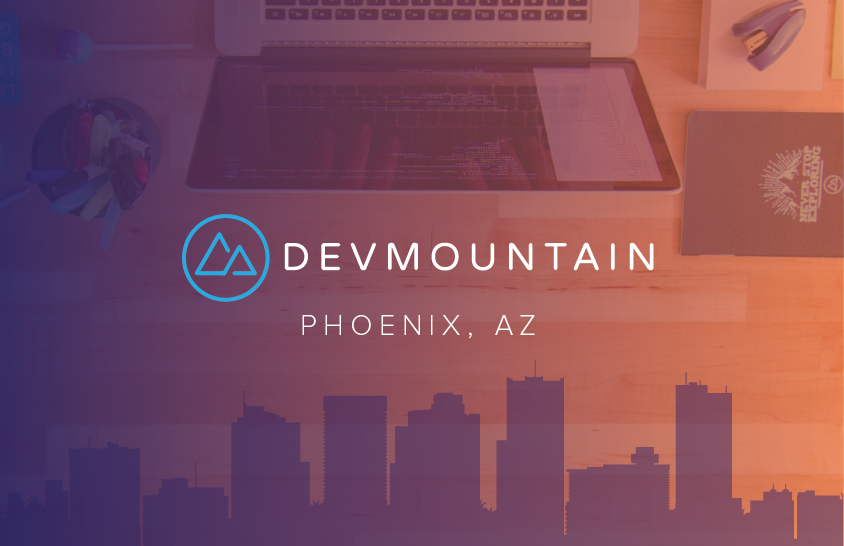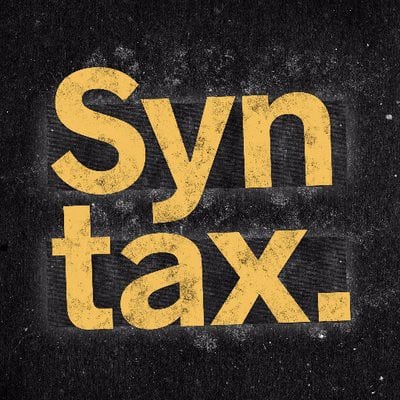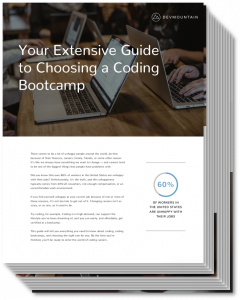This article is for anyone who is about to attend a coding bootcamp. More specifically, this article is for anyone who is considering the Web Development Course at DevMountain. I am writing from a perspective of having no prior knowledge of coding or web development before my experience at DevMountain.

Why I wrote this?
The main reason that I am writing this article is because I want to contribute back to the community that made me the developer I am today. Most of the resources I found online were free and helped me tremendously.
I remember when I was mentally preparing for my time at DevMountain, I wanted as much information about what to expect when coming to DevMountain. The main thing I heard from other people’s experience was, “It’s very difficult but worth it.” That was not enough for me. I thought of this bootcamp as a battle I was about to have and wanted to know as much information as possible before heading into it.
Who am I?

My name is Andrew Nam and I am writing this article as a student mentor at DevMountain. I went through the Web Development Immersive Bootcamp at the Phoenix campus from June 18, 2018 – September 14, 2018. During the bootcamp, I primarily learned Reactjs.
In May of 2018, I graduated from University of North Texas with a bachelor’s degree in psychology. I came out of college wanting a fresh start and a new direction. This eventually led me to DevMountain.
Becoming a web developer is a 5-7 month process.
Although the bootcamp only lasts for three months, transitioning from knowing nothing to getting a job in web development is a five to seven month process. I spent one month before going to the bootcamp learning the basics of JavaScript.
Although there are no coding knowledge admission requirements, there are fundamentals that need to be understood before starting the first day of class. DevMountain makes this preparation process easier by providing over 50 hours worth of pre-course materials to complete prior to your first day. The next three months deals with the actual bootcamp itself. The last month(s) involves trying to find a job pertaining to web development. I was fortunate enough to get a job right off the bat by becoming a student mentor. However, I will have to go through the process of finding a job that is outside of DevMountain.
It’s all about setup for transition.
The key to being successful at any coding bootcamp is preparation. The pre-course material that DevMountain provides is given to prepare you for your experience at DevMountain. Your time at DevMountain should be utilized to prepare yourself for getting a job as a junior developer.
Schedule of DevMountain’s Coding Bootcamp
*This can be seen on the course guide that DevMountain provides on their site.
9:30am Toy Problem
10:00am-12:30pm Lecture
12:30pm-1:30pm Lunch
1:30pm-2:00pm Finish Lecture
2:00pm-5:15pm Afternoon Project
5:15pm-5:30pm Stand ups
There are times where this varies but for the most part this is the schedule that one should expect when coming to DevMountain. The afternoon project schedule block is where I had the most flexibility with that I could do with my time. After I finished my afternoon project, I decided to use that free time to help those around me with their code. For the most part, the 9-5pm schedule can’t be optimized that much. DevMountain provides a hefty workload that will keep you busy during those hours.
Optimization Time
General Guidelines
• The ultimate goal is to stay consistent with your routine. Whatever you need to do to stay consistent, do it.
• The less distractions you have in your life, the better time you will have at DevMountain. If you feel like you need to stay in housing to get away from home, then do it. I moved from Dallas to Phoenix because I knew staying at home would be a huge distraction for me.
• To avoid being surprised or confused with the new material being taught, make sure to familiarize yourself with the terminology before encountering them in a lecture setting. If you get caught up on the vocabulary during the lecture, it is easy to fall behind and get lost.
• Experience DevMountain through 5 other people, not just yourself. It is extremely beneficial to see how other people write code. You can see how someone else writes their code and what errors they face. *This is great practice for debugging because you will be spending a lot of your time as a developer looking at other people’s code. When I looked at other people’s projects/code, it felt as if I went through DevMountain multiple times.
Who you hang out with matters!

When I was living in the apartments, what I did at night was heavily influenced by my roommates. You want to make sure the people you hang out with outside of class have similar goals as you. It is very easy to stop coding at night and just watch T.V., especially is everyone around you is doing the same. I believe I could have learned more by stepping out of the apartment to study someplace else. When you go outside the apartments, you then have the option to invite others to study with as well.
It is okay to be selfish and to prioritize yourself above everything else. You are spending half a year with the addition of tuition cost to transition into a new career and lifestyle. The more you put into your coding bootcamp, the more you will get out of it. There is no cap to how much you can grow during your time at a coding bootcamp.
Micro Optimization
Note-Taking
What helped me solidify certain concepts is typing notes with comments in a JavaScript file about new code I learned that day. I found it helpful to isolate parts of code so that it was easy to grasp the concept better. I would then manually put these separated pieces together like lego pieces and saw how things fit together. After I had a basic concept down like creating a simple server file, I would then practice re-typing those same lines of code. Copying and pasting code does get the job done quicker but the important thing is to retain the information.
Exercise/Decompression

It is impossible for me to code 24/7 without getting burned out. I knew that I needed to break away from coding on a daily basis. Exercising helped me keep my energy consistently high, correct my posture, and break away from coding for a short while. I got into yoga during my time at DevMountain and it has helped me tremendously. I was able to wake up at 5am with full energy when I stayed consistent with my yoga practices. I would recommend taking an hour off every day to decompress in your own way.
Meals

Everyone is different on what they prefer to eat, but I believe the principles to follow should be universal. The general principles with my meals were “Quick, Simple, & Healthy.” I needed to make three meals a day that were easy to purchase and make which would allow me to focus more on coding. I knew that once I had more job security, I could readjust my meal plan to be more healthy and optimal for my workouts.
This was the meal plan I was able to stick to consistently, and I did not even perfect this meal plan until after the bootcamp had finished. I made the mistake of wanting to try new things and experiment which took time away from coding. I now stick to this meal plan as a student mentor. My schedule is more or less the same as it was during my time as a student.
Breakfast: Daves Killer Bread Bagel, Peanut Butter, Perky Jerky, Almonds/Walnuts
Lunch: Rotisserie Chicken, Eggs, Sweet Potato, Brussel Sprouts
Dinner: Soup
Grocery Store: Trader Joe’s or Costco
This meal plan was a great alternative to eating out all the time or just cooking instant foods such as Ramen which is what I did when I did not plan out my meals. I would recommend just making simple meals that you can stick to consistently so that you can focus more on writing code.
Weekly Routine
Monday-Friday: Grind
Saturday: Grocery Shopping, Hang out with classmates, Laundary
Sunday: Meal Prep, Prepare for Monday-Friday
The weekends were used to prepare my weekdays for full-grind mode.
Every Saturday, I took time away from code to hang out with my classmates. It is more important to take time to connect with your classmates because they will be the ones that will help you stay motivated when you feel down. Your classmates will also be your support network after the bootcamp has finished and you are there trying to find a job. It is also important to stay fresh with your life and to stop to smell the roses. I was in a new setting when I moved to Phoenix and I might not ever have the opportunity to experience it again.
For Sundays, I have a weekly meeting with my older brother in the morning to not only stay connected but to also keep each other accountable for the goals we strive after. During the early afternoon, I would prep my meals for the entire week which would take a couple hours or less. With the rest of the day, I plan a schedule based on how the week is going to be and then go back to studying.
Daily Routine
7:00am Wake up, get ready for your day
8:45am-9:00am Walk to school (listen to podcast)
9:30am-5:30pm Code
5:30pm-5:45pm Walk back to apartments, prepare mind for night shift
6:00pm-7:00pm Dinner, relax
7:00pm-9:00pm Studying & preparing for the next day
9:00pm-10:00pm Yoga/Exercise
10:00pm-11:00pm Prepare to sleep, shut electronics off by 11pm, Dream about code
The key to being successful with any plan is having realistic options. The way I stayed consistent with my routine is by telling myself, “I need X amount of hours to help retain the information I learned and to be able to code the next day.” I was not perfect with my routine either. I kept to this schedule about 80% of the time I spent here at DevMountain. There were times where I stayed up later than usual trying to finish my assignments or working on a project. The important thing is that I had planned out a routine to keep me center.
I am not the type of person that could grind super hard 24/7. More difficultly arises when you have to keep yourself accountable after the bootcamp since there is no one checking on your progress. It is easy to fall into a rut then stop coding which would lead to not finding a job. It is important to plan for a routine you feel you can realistically do once the bootcamp is over. Long before the bootcamp was over, I was always thinking about creating a routine I can do for a long time until I find a stable job.

My recommendation for a podcast is Syntax which features two full-stack web developers, Wes Bos and Scott Tolinski. They primarily talk about JavaScript and Reactjs related topics. I love this podcast because they talk about code in a situational, spontaneous manner versus being rigid and instructional.
Macro Optimization
The bootcamp is a three month marathon. Marathons are not a test of speed but of endurance.
For the first two weeks, I recommend using the time to hangout with your classmates and to adjust to your new environment. The first week of DevMountain starts off slow and is mostly review and pre-course content. Instead of getting ahead in content, I believe it is more important to work on your social skills. Your career will most likely include working with other developers. Working with other developers is an equally important skill to have along with having the ability to code.
For the next 1-2 months, I recommend re-typing your code to solidify your understanding of any concept. I would not recommend quickly getting everything done to get ahead. What is most important is creating a strong understanding of everything being taught. I started off with the mentality of wanting to finish everything as quickly as possible, only to forget what I learned a couple weeks later. I still sometimes look back at my older projects and realize I do not remember how or why I wrote some of the code that I did and I was the one that wrote it! I decided to change my mentality and to go more slowly so that I actually had a good idea of the code I was writing.
There is no need to diversify your portfolio in a three month period. DevMountain sets up a good program so that you will learn what is important enough to become a developer. Don’t try to spread your focus in order to learn a different language or framework. This will give you a surface level understanding of many concepts rather than a deep understanding of one. *Master JavaScript & one framework first, then you can move on during your mid-level years of your career.
The last month of the bootcamp should be used to start preparing for finding a job. Finding a job after attending a bootcamp can vary from one week to even one year. It is important to set yourself up to find a job as soon as you get out of the bootcamp so that your momentum stays consistent. My goal when I came to DevMountain was to become a student mentor. I tailored my time here at DevMountain to match that. I believe a person should tailor their time at DevMountain to match the type of career they want. This also gives you an easier time deciding on what projects to build as well. I spent the extra time I had during the 9am-5pm block schedule helping out other students because I wanted to practice becoming a student mentor starting day one. I remember my classmates jokingly called me a “third mentor” since we already had two mentors helping us out.
I am glad to have been in such a great class as mine. After the cohort ended, my classmates kept up with each other in our Slack channel. Some of my classmates were awesome enough to post trivia questions and coding challenges so that they could study together while they were finding a job. The best moment was when one of our classmates found a job and announced it and we all cheered and congratulated that person.
Life is not only about coding, even if you’re at a coding bootcamp.
I remember one of my roommates wishing that his life outside of coding could be put on hold while he was learning. Unfortunately, life does not work that way. There’s responsibilities you have to take care of and new problems that get thrown at your unexpectedly. I had achilles tendonitis during my time at DevMountain, which made it troublesome to walk. I had to stop lifting weights as well which upset me because I knew I would lose progress with my strength. On the bright side, that period is what led me to finding yoga. The universe has a funny way of giving everything you desire in your life. They key to being successful at any coding bootcamp is to stay true to your goals, understand why you wanted to change, and have a healthy support group that will help you stay on track. Thanks for reading and I hope you learned something new.
[cta id=”529″ vid=”0″]






